Evidence-Based Approach Review: Assertive Community Treatment
VerifiedAdded on 2022/11/24
|7
|1718
|184
Report
AI Summary
This report provides a comprehensive review of the Assertive Community Treatment (ACT) approach, an evidence-based practice in clinical mental health counseling. The assignment explores the principles of ACT, including its multidisciplinary team approach, out-of-setting treatment, personalized care, and long-term service provision. The report highlights the effectiveness of ACT in treating severe mental health conditions such as schizophrenia, bipolar disorder, and depression. It discusses key aspects like vocational expectations, psychoeducational services, and family and peer support, as well as community integration. The review also references studies and approvals from organizations like SAMHSA and the U.S. Department of Veterans Affairs, underscoring ACT's cost-effectiveness and suitability for diverse populations. The conclusion emphasizes ACT's role in fostering patient recovery and resilience, making it a crucial approach for mental health interventions.
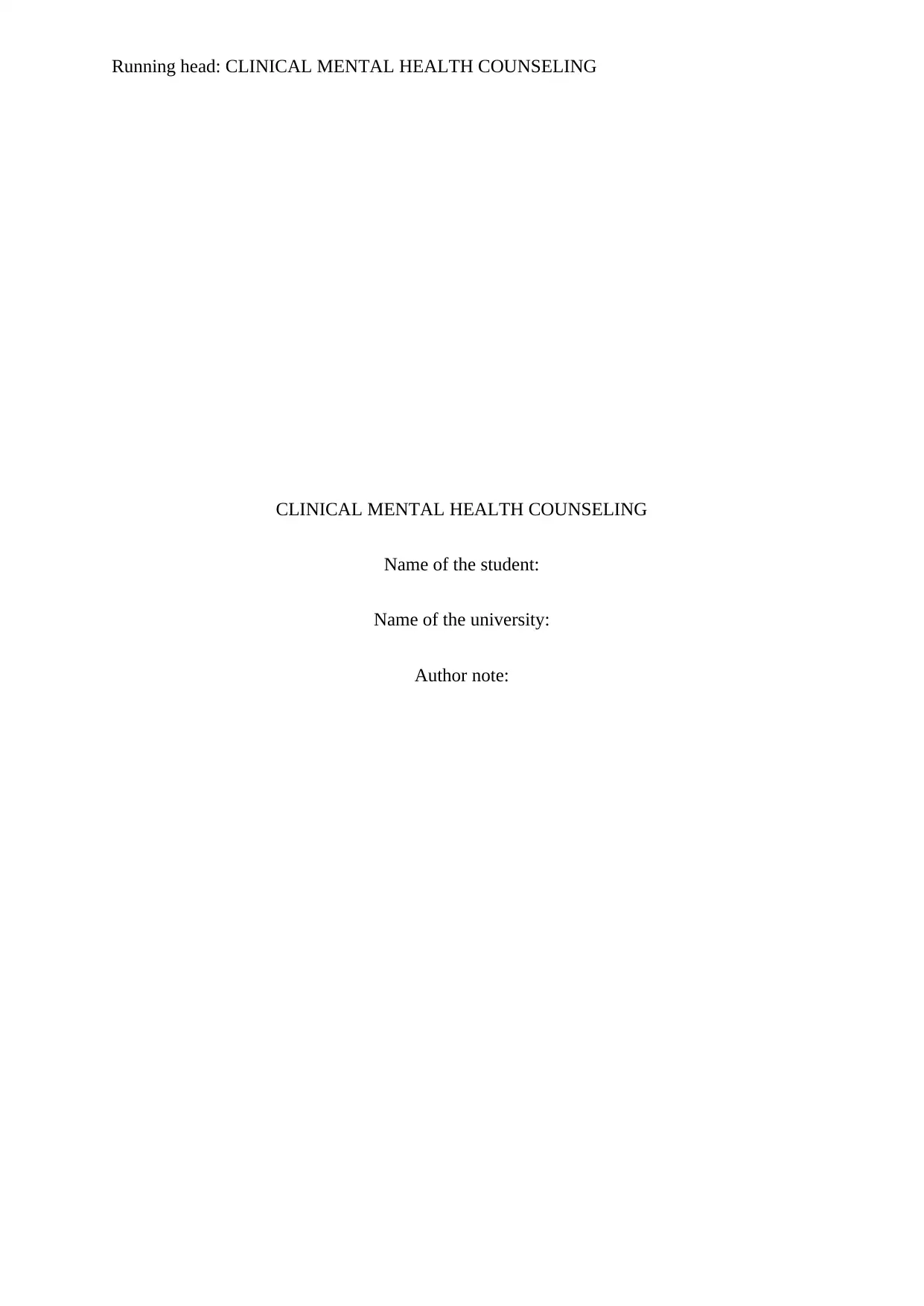
Running head: CLINICAL MENTAL HEALTH COUNSELING
CLINICAL MENTAL HEALTH COUNSELING
Name of the student:
Name of the university:
Author note:
CLINICAL MENTAL HEALTH COUNSELING
Name of the student:
Name of the university:
Author note:
Paraphrase This Document
Need a fresh take? Get an instant paraphrase of this document with our AI Paraphraser
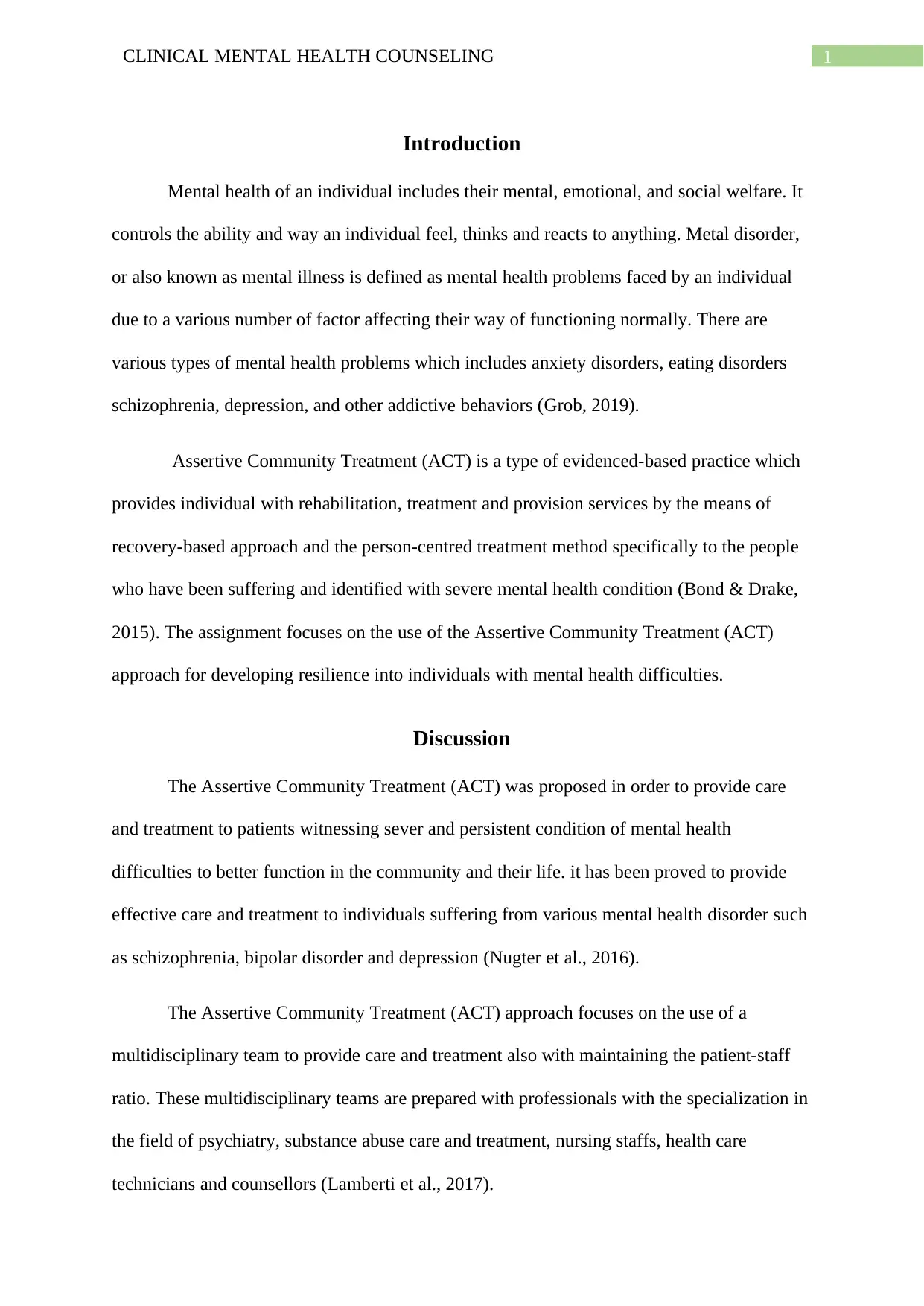
1CLINICAL MENTAL HEALTH COUNSELING
Introduction
Mental health of an individual includes their mental, emotional, and social welfare. It
controls the ability and way an individual feel, thinks and reacts to anything. Metal disorder,
or also known as mental illness is defined as mental health problems faced by an individual
due to a various number of factor affecting their way of functioning normally. There are
various types of mental health problems which includes anxiety disorders, eating disorders
schizophrenia, depression, and other addictive behaviors (Grob, 2019).
Assertive Community Treatment (ACT) is a type of evidenced-based practice which
provides individual with rehabilitation, treatment and provision services by the means of
recovery-based approach and the person-centred treatment method specifically to the people
who have been suffering and identified with severe mental health condition (Bond & Drake,
2015). The assignment focuses on the use of the Assertive Community Treatment (ACT)
approach for developing resilience into individuals with mental health difficulties.
Discussion
The Assertive Community Treatment (ACT) was proposed in order to provide care
and treatment to patients witnessing sever and persistent condition of mental health
difficulties to better function in the community and their life. it has been proved to provide
effective care and treatment to individuals suffering from various mental health disorder such
as schizophrenia, bipolar disorder and depression (Nugter et al., 2016).
The Assertive Community Treatment (ACT) approach focuses on the use of a
multidisciplinary team to provide care and treatment also with maintaining the patient-staff
ratio. These multidisciplinary teams are prepared with professionals with the specialization in
the field of psychiatry, substance abuse care and treatment, nursing staffs, health care
technicians and counsellors (Lamberti et al., 2017).
Introduction
Mental health of an individual includes their mental, emotional, and social welfare. It
controls the ability and way an individual feel, thinks and reacts to anything. Metal disorder,
or also known as mental illness is defined as mental health problems faced by an individual
due to a various number of factor affecting their way of functioning normally. There are
various types of mental health problems which includes anxiety disorders, eating disorders
schizophrenia, depression, and other addictive behaviors (Grob, 2019).
Assertive Community Treatment (ACT) is a type of evidenced-based practice which
provides individual with rehabilitation, treatment and provision services by the means of
recovery-based approach and the person-centred treatment method specifically to the people
who have been suffering and identified with severe mental health condition (Bond & Drake,
2015). The assignment focuses on the use of the Assertive Community Treatment (ACT)
approach for developing resilience into individuals with mental health difficulties.
Discussion
The Assertive Community Treatment (ACT) was proposed in order to provide care
and treatment to patients witnessing sever and persistent condition of mental health
difficulties to better function in the community and their life. it has been proved to provide
effective care and treatment to individuals suffering from various mental health disorder such
as schizophrenia, bipolar disorder and depression (Nugter et al., 2016).
The Assertive Community Treatment (ACT) approach focuses on the use of a
multidisciplinary team to provide care and treatment also with maintaining the patient-staff
ratio. These multidisciplinary teams are prepared with professionals with the specialization in
the field of psychiatry, substance abuse care and treatment, nursing staffs, health care
technicians and counsellors (Lamberti et al., 2017).
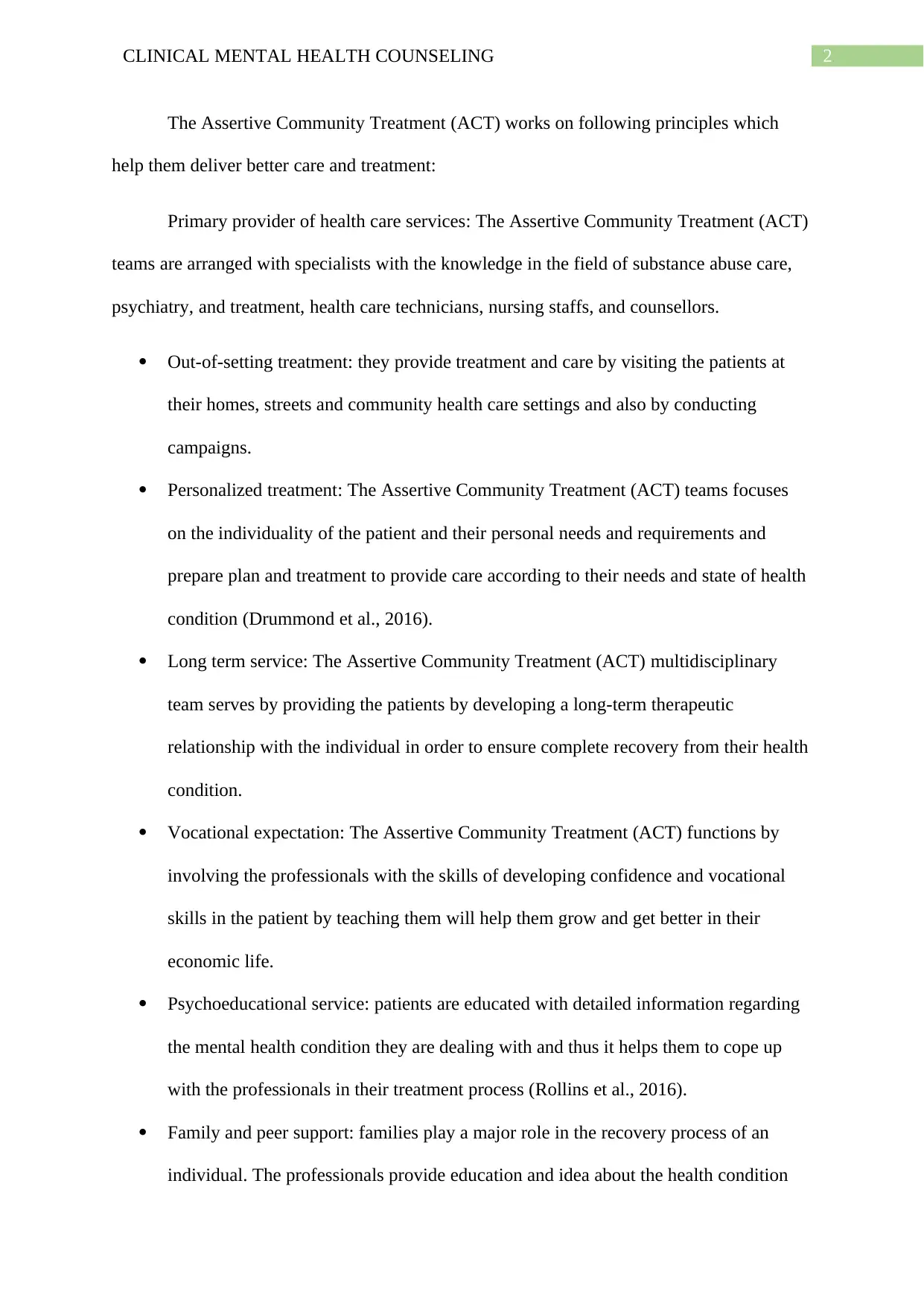
2CLINICAL MENTAL HEALTH COUNSELING
The Assertive Community Treatment (ACT) works on following principles which
help them deliver better care and treatment:
Primary provider of health care services: The Assertive Community Treatment (ACT)
teams are arranged with specialists with the knowledge in the field of substance abuse care,
psychiatry, and treatment, health care technicians, nursing staffs, and counsellors.
Out-of-setting treatment: they provide treatment and care by visiting the patients at
their homes, streets and community health care settings and also by conducting
campaigns.
Personalized treatment: The Assertive Community Treatment (ACT) teams focuses
on the individuality of the patient and their personal needs and requirements and
prepare plan and treatment to provide care according to their needs and state of health
condition (Drummond et al., 2016).
Long term service: The Assertive Community Treatment (ACT) multidisciplinary
team serves by providing the patients by developing a long-term therapeutic
relationship with the individual in order to ensure complete recovery from their health
condition.
Vocational expectation: The Assertive Community Treatment (ACT) functions by
involving the professionals with the skills of developing confidence and vocational
skills in the patient by teaching them will help them grow and get better in their
economic life.
Psychoeducational service: patients are educated with detailed information regarding
the mental health condition they are dealing with and thus it helps them to cope up
with the professionals in their treatment process (Rollins et al., 2016).
Family and peer support: families play a major role in the recovery process of an
individual. The professionals provide education and idea about the health condition
The Assertive Community Treatment (ACT) works on following principles which
help them deliver better care and treatment:
Primary provider of health care services: The Assertive Community Treatment (ACT)
teams are arranged with specialists with the knowledge in the field of substance abuse care,
psychiatry, and treatment, health care technicians, nursing staffs, and counsellors.
Out-of-setting treatment: they provide treatment and care by visiting the patients at
their homes, streets and community health care settings and also by conducting
campaigns.
Personalized treatment: The Assertive Community Treatment (ACT) teams focuses
on the individuality of the patient and their personal needs and requirements and
prepare plan and treatment to provide care according to their needs and state of health
condition (Drummond et al., 2016).
Long term service: The Assertive Community Treatment (ACT) multidisciplinary
team serves by providing the patients by developing a long-term therapeutic
relationship with the individual in order to ensure complete recovery from their health
condition.
Vocational expectation: The Assertive Community Treatment (ACT) functions by
involving the professionals with the skills of developing confidence and vocational
skills in the patient by teaching them will help them grow and get better in their
economic life.
Psychoeducational service: patients are educated with detailed information regarding
the mental health condition they are dealing with and thus it helps them to cope up
with the professionals in their treatment process (Rollins et al., 2016).
Family and peer support: families play a major role in the recovery process of an
individual. The professionals provide education and idea about the health condition
⊘ This is a preview!⊘
Do you want full access?
Subscribe today to unlock all pages.

Trusted by 1+ million students worldwide
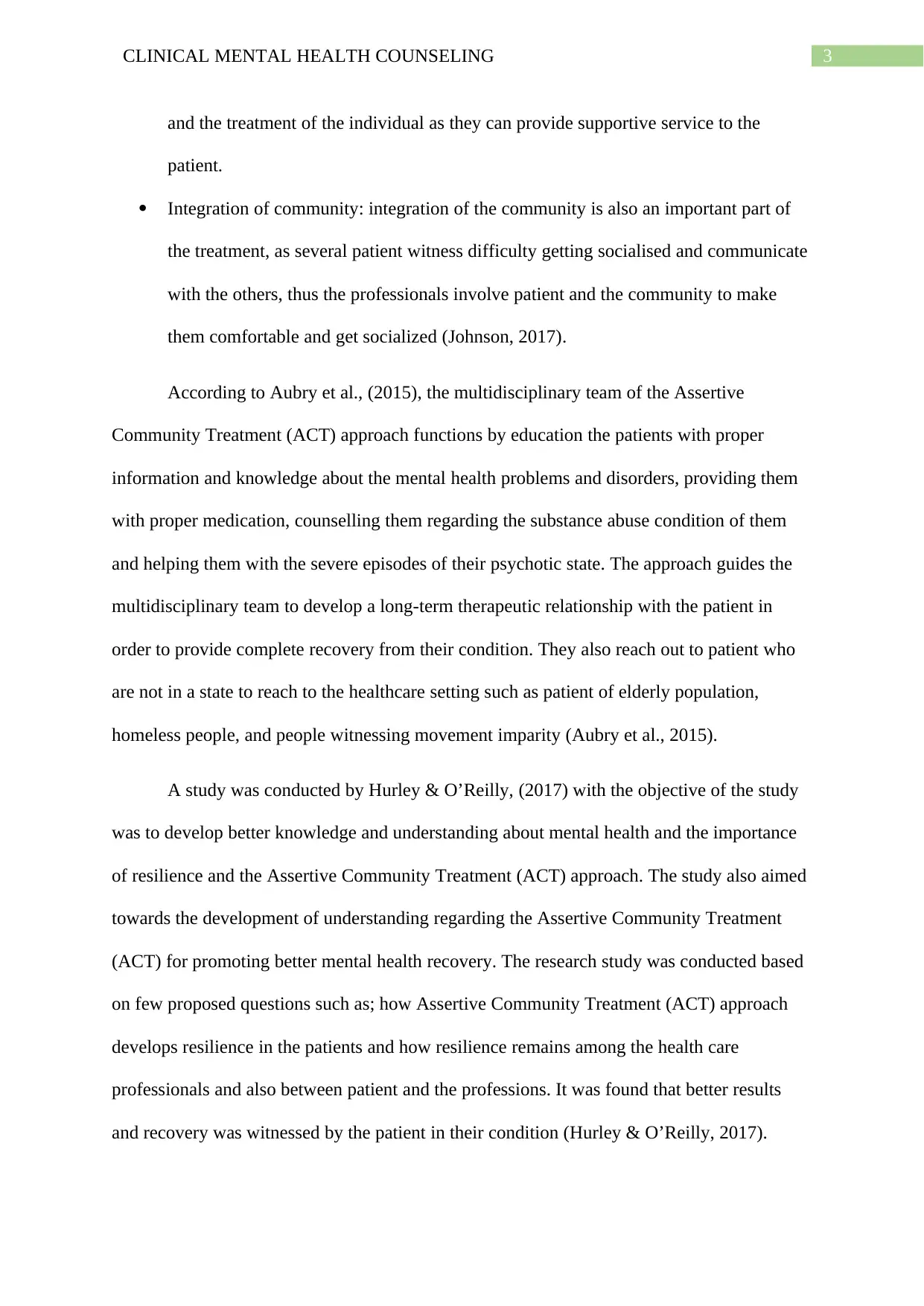
3CLINICAL MENTAL HEALTH COUNSELING
and the treatment of the individual as they can provide supportive service to the
patient.
Integration of community: integration of the community is also an important part of
the treatment, as several patient witness difficulty getting socialised and communicate
with the others, thus the professionals involve patient and the community to make
them comfortable and get socialized (Johnson, 2017).
According to Aubry et al., (2015), the multidisciplinary team of the Assertive
Community Treatment (ACT) approach functions by education the patients with proper
information and knowledge about the mental health problems and disorders, providing them
with proper medication, counselling them regarding the substance abuse condition of them
and helping them with the severe episodes of their psychotic state. The approach guides the
multidisciplinary team to develop a long-term therapeutic relationship with the patient in
order to provide complete recovery from their condition. They also reach out to patient who
are not in a state to reach to the healthcare setting such as patient of elderly population,
homeless people, and people witnessing movement imparity (Aubry et al., 2015).
A study was conducted by Hurley & O’Reilly, (2017) with the objective of the study
was to develop better knowledge and understanding about mental health and the importance
of resilience and the Assertive Community Treatment (ACT) approach. The study also aimed
towards the development of understanding regarding the Assertive Community Treatment
(ACT) for promoting better mental health recovery. The research study was conducted based
on few proposed questions such as; how Assertive Community Treatment (ACT) approach
develops resilience in the patients and how resilience remains among the health care
professionals and also between patient and the professions. It was found that better results
and recovery was witnessed by the patient in their condition (Hurley & O’Reilly, 2017).
and the treatment of the individual as they can provide supportive service to the
patient.
Integration of community: integration of the community is also an important part of
the treatment, as several patient witness difficulty getting socialised and communicate
with the others, thus the professionals involve patient and the community to make
them comfortable and get socialized (Johnson, 2017).
According to Aubry et al., (2015), the multidisciplinary team of the Assertive
Community Treatment (ACT) approach functions by education the patients with proper
information and knowledge about the mental health problems and disorders, providing them
with proper medication, counselling them regarding the substance abuse condition of them
and helping them with the severe episodes of their psychotic state. The approach guides the
multidisciplinary team to develop a long-term therapeutic relationship with the patient in
order to provide complete recovery from their condition. They also reach out to patient who
are not in a state to reach to the healthcare setting such as patient of elderly population,
homeless people, and people witnessing movement imparity (Aubry et al., 2015).
A study was conducted by Hurley & O’Reilly, (2017) with the objective of the study
was to develop better knowledge and understanding about mental health and the importance
of resilience and the Assertive Community Treatment (ACT) approach. The study also aimed
towards the development of understanding regarding the Assertive Community Treatment
(ACT) for promoting better mental health recovery. The research study was conducted based
on few proposed questions such as; how Assertive Community Treatment (ACT) approach
develops resilience in the patients and how resilience remains among the health care
professionals and also between patient and the professions. It was found that better results
and recovery was witnessed by the patient in their condition (Hurley & O’Reilly, 2017).
Paraphrase This Document
Need a fresh take? Get an instant paraphrase of this document with our AI Paraphraser
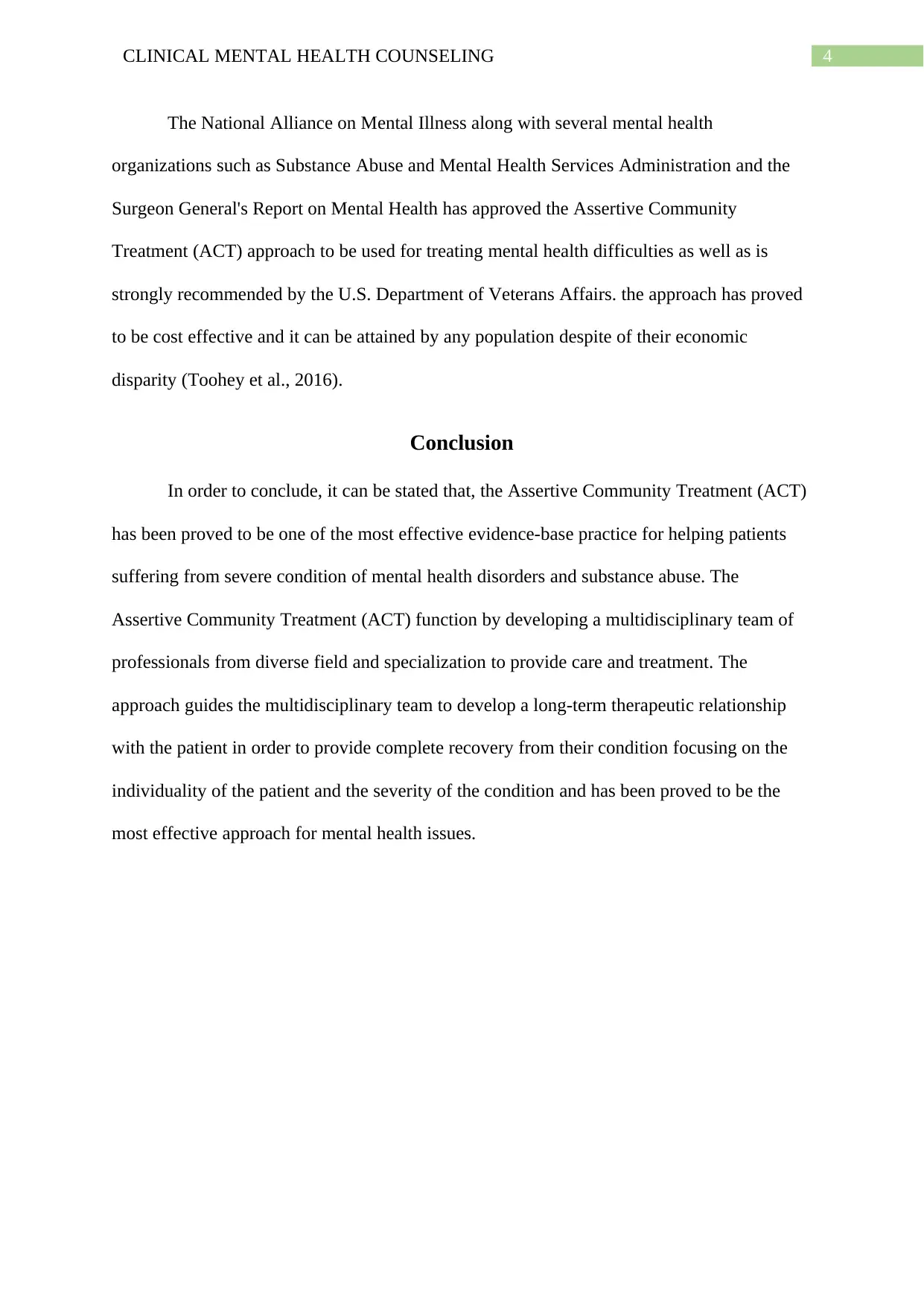
4CLINICAL MENTAL HEALTH COUNSELING
The National Alliance on Mental Illness along with several mental health
organizations such as Substance Abuse and Mental Health Services Administration and the
Surgeon General's Report on Mental Health has approved the Assertive Community
Treatment (ACT) approach to be used for treating mental health difficulties as well as is
strongly recommended by the U.S. Department of Veterans Affairs. the approach has proved
to be cost effective and it can be attained by any population despite of their economic
disparity (Toohey et al., 2016).
Conclusion
In order to conclude, it can be stated that, the Assertive Community Treatment (ACT)
has been proved to be one of the most effective evidence-base practice for helping patients
suffering from severe condition of mental health disorders and substance abuse. The
Assertive Community Treatment (ACT) function by developing a multidisciplinary team of
professionals from diverse field and specialization to provide care and treatment. The
approach guides the multidisciplinary team to develop a long-term therapeutic relationship
with the patient in order to provide complete recovery from their condition focusing on the
individuality of the patient and the severity of the condition and has been proved to be the
most effective approach for mental health issues.
The National Alliance on Mental Illness along with several mental health
organizations such as Substance Abuse and Mental Health Services Administration and the
Surgeon General's Report on Mental Health has approved the Assertive Community
Treatment (ACT) approach to be used for treating mental health difficulties as well as is
strongly recommended by the U.S. Department of Veterans Affairs. the approach has proved
to be cost effective and it can be attained by any population despite of their economic
disparity (Toohey et al., 2016).
Conclusion
In order to conclude, it can be stated that, the Assertive Community Treatment (ACT)
has been proved to be one of the most effective evidence-base practice for helping patients
suffering from severe condition of mental health disorders and substance abuse. The
Assertive Community Treatment (ACT) function by developing a multidisciplinary team of
professionals from diverse field and specialization to provide care and treatment. The
approach guides the multidisciplinary team to develop a long-term therapeutic relationship
with the patient in order to provide complete recovery from their condition focusing on the
individuality of the patient and the severity of the condition and has been proved to be the
most effective approach for mental health issues.
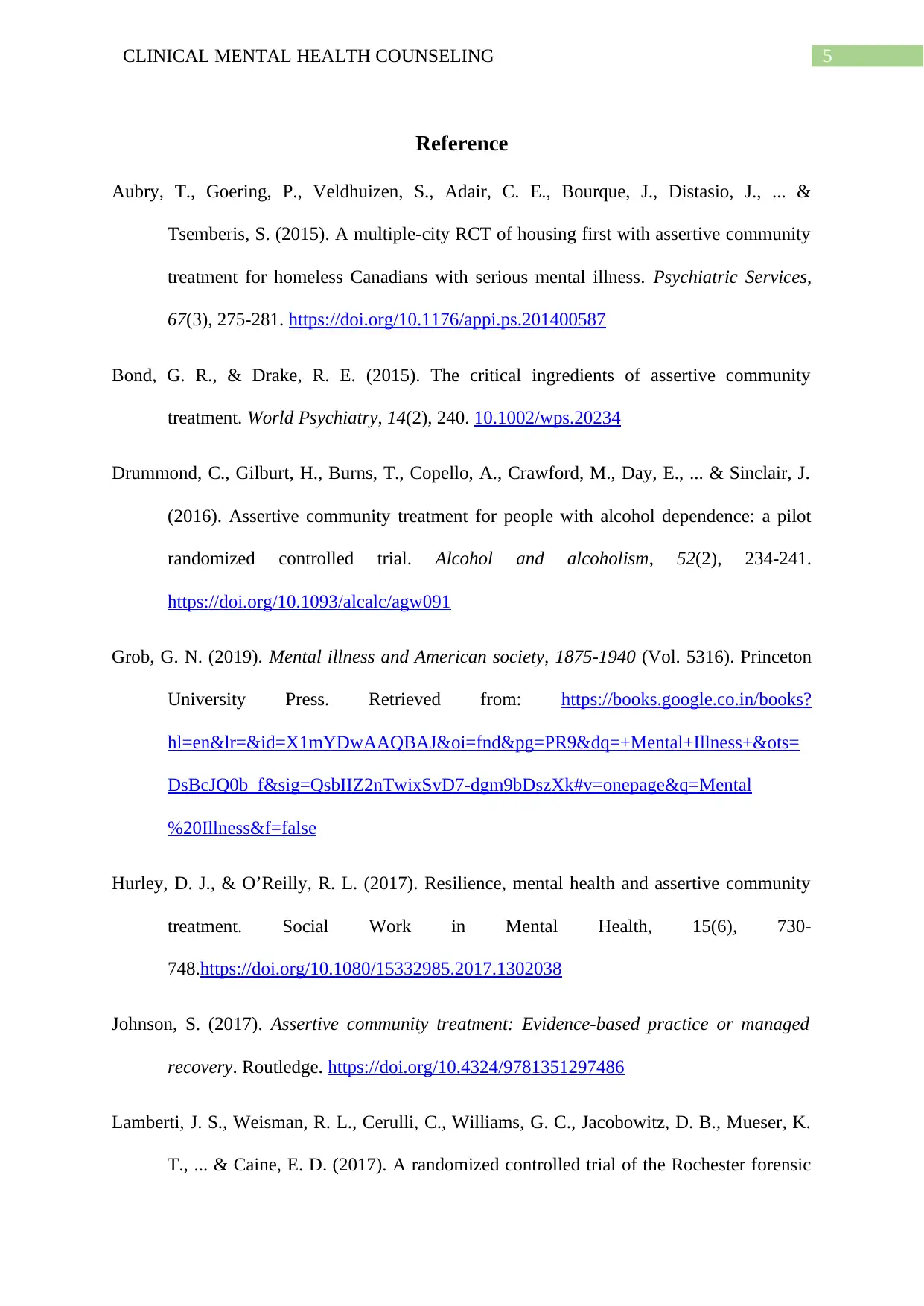
5CLINICAL MENTAL HEALTH COUNSELING
Reference
Aubry, T., Goering, P., Veldhuizen, S., Adair, C. E., Bourque, J., Distasio, J., ... &
Tsemberis, S. (2015). A multiple-city RCT of housing first with assertive community
treatment for homeless Canadians with serious mental illness. Psychiatric Services,
67(3), 275-281. https://doi.org/10.1176/appi.ps.201400587
Bond, G. R., & Drake, R. E. (2015). The critical ingredients of assertive community
treatment. World Psychiatry, 14(2), 240. 10.1002/wps.20234
Drummond, C., Gilburt, H., Burns, T., Copello, A., Crawford, M., Day, E., ... & Sinclair, J.
(2016). Assertive community treatment for people with alcohol dependence: a pilot
randomized controlled trial. Alcohol and alcoholism, 52(2), 234-241.
https://doi.org/10.1093/alcalc/agw091
Grob, G. N. (2019). Mental illness and American society, 1875-1940 (Vol. 5316). Princeton
University Press. Retrieved from: https://books.google.co.in/books?
hl=en&lr=&id=X1mYDwAAQBAJ&oi=fnd&pg=PR9&dq=+Mental+Illness+&ots=
DsBcJQ0b_f&sig=QsbIIZ2nTwixSvD7-dgm9bDszXk#v=onepage&q=Mental
%20Illness&f=false
Hurley, D. J., & O’Reilly, R. L. (2017). Resilience, mental health and assertive community
treatment. Social Work in Mental Health, 15(6), 730-
748.https://doi.org/10.1080/15332985.2017.1302038
Johnson, S. (2017). Assertive community treatment: Evidence-based practice or managed
recovery. Routledge. https://doi.org/10.4324/9781351297486
Lamberti, J. S., Weisman, R. L., Cerulli, C., Williams, G. C., Jacobowitz, D. B., Mueser, K.
T., ... & Caine, E. D. (2017). A randomized controlled trial of the Rochester forensic
Reference
Aubry, T., Goering, P., Veldhuizen, S., Adair, C. E., Bourque, J., Distasio, J., ... &
Tsemberis, S. (2015). A multiple-city RCT of housing first with assertive community
treatment for homeless Canadians with serious mental illness. Psychiatric Services,
67(3), 275-281. https://doi.org/10.1176/appi.ps.201400587
Bond, G. R., & Drake, R. E. (2015). The critical ingredients of assertive community
treatment. World Psychiatry, 14(2), 240. 10.1002/wps.20234
Drummond, C., Gilburt, H., Burns, T., Copello, A., Crawford, M., Day, E., ... & Sinclair, J.
(2016). Assertive community treatment for people with alcohol dependence: a pilot
randomized controlled trial. Alcohol and alcoholism, 52(2), 234-241.
https://doi.org/10.1093/alcalc/agw091
Grob, G. N. (2019). Mental illness and American society, 1875-1940 (Vol. 5316). Princeton
University Press. Retrieved from: https://books.google.co.in/books?
hl=en&lr=&id=X1mYDwAAQBAJ&oi=fnd&pg=PR9&dq=+Mental+Illness+&ots=
DsBcJQ0b_f&sig=QsbIIZ2nTwixSvD7-dgm9bDszXk#v=onepage&q=Mental
%20Illness&f=false
Hurley, D. J., & O’Reilly, R. L. (2017). Resilience, mental health and assertive community
treatment. Social Work in Mental Health, 15(6), 730-
748.https://doi.org/10.1080/15332985.2017.1302038
Johnson, S. (2017). Assertive community treatment: Evidence-based practice or managed
recovery. Routledge. https://doi.org/10.4324/9781351297486
Lamberti, J. S., Weisman, R. L., Cerulli, C., Williams, G. C., Jacobowitz, D. B., Mueser, K.
T., ... & Caine, E. D. (2017). A randomized controlled trial of the Rochester forensic
⊘ This is a preview!⊘
Do you want full access?
Subscribe today to unlock all pages.

Trusted by 1+ million students worldwide
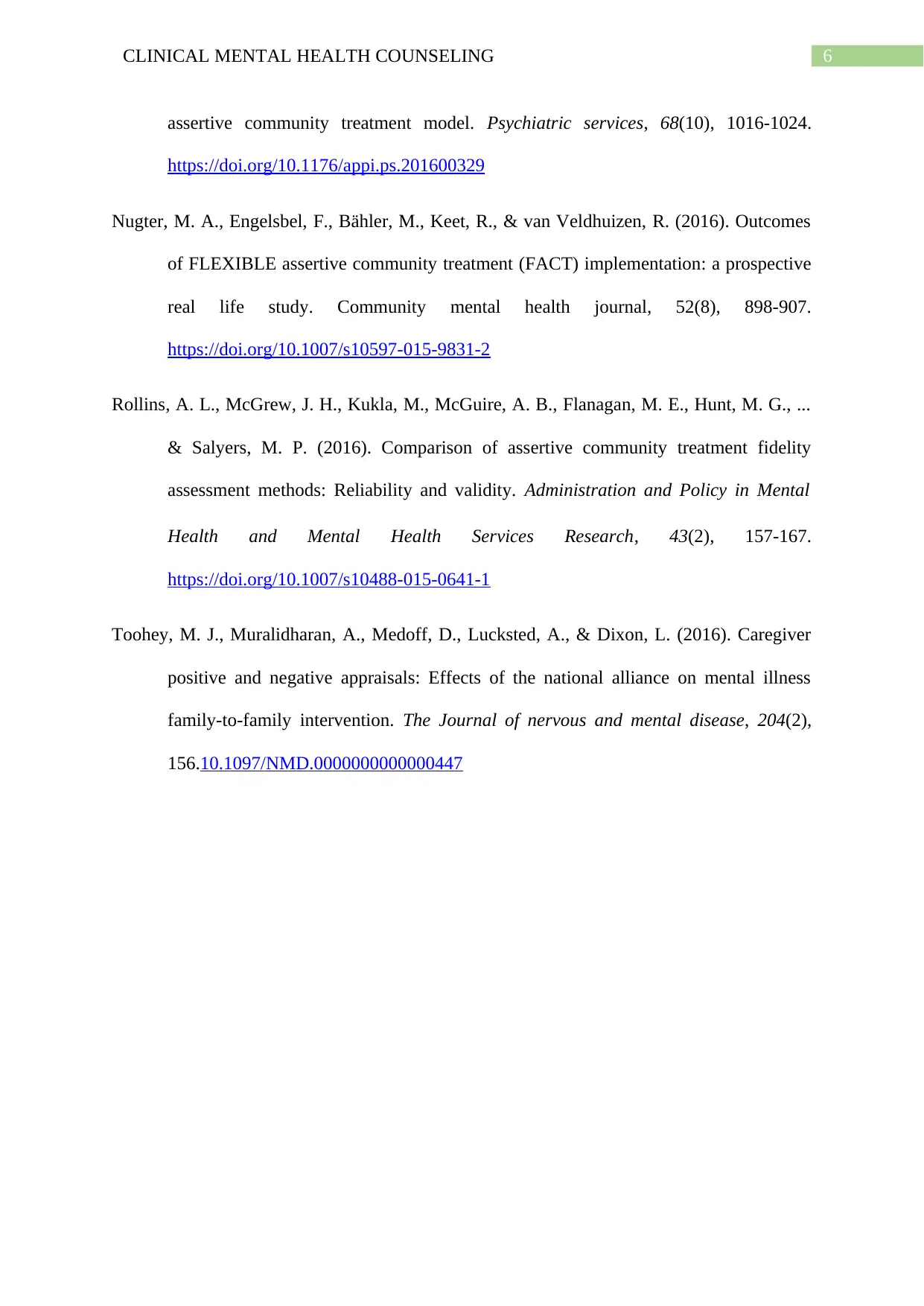
6CLINICAL MENTAL HEALTH COUNSELING
assertive community treatment model. Psychiatric services, 68(10), 1016-1024.
https://doi.org/10.1176/appi.ps.201600329
Nugter, M. A., Engelsbel, F., Bähler, M., Keet, R., & van Veldhuizen, R. (2016). Outcomes
of FLEXIBLE assertive community treatment (FACT) implementation: a prospective
real life study. Community mental health journal, 52(8), 898-907.
https://doi.org/10.1007/s10597-015-9831-2
Rollins, A. L., McGrew, J. H., Kukla, M., McGuire, A. B., Flanagan, M. E., Hunt, M. G., ...
& Salyers, M. P. (2016). Comparison of assertive community treatment fidelity
assessment methods: Reliability and validity. Administration and Policy in Mental
Health and Mental Health Services Research, 43(2), 157-167.
https://doi.org/10.1007/s10488-015-0641-1
Toohey, M. J., Muralidharan, A., Medoff, D., Lucksted, A., & Dixon, L. (2016). Caregiver
positive and negative appraisals: Effects of the national alliance on mental illness
family-to-family intervention. The Journal of nervous and mental disease, 204(2),
156.10.1097/NMD.0000000000000447
assertive community treatment model. Psychiatric services, 68(10), 1016-1024.
https://doi.org/10.1176/appi.ps.201600329
Nugter, M. A., Engelsbel, F., Bähler, M., Keet, R., & van Veldhuizen, R. (2016). Outcomes
of FLEXIBLE assertive community treatment (FACT) implementation: a prospective
real life study. Community mental health journal, 52(8), 898-907.
https://doi.org/10.1007/s10597-015-9831-2
Rollins, A. L., McGrew, J. H., Kukla, M., McGuire, A. B., Flanagan, M. E., Hunt, M. G., ...
& Salyers, M. P. (2016). Comparison of assertive community treatment fidelity
assessment methods: Reliability and validity. Administration and Policy in Mental
Health and Mental Health Services Research, 43(2), 157-167.
https://doi.org/10.1007/s10488-015-0641-1
Toohey, M. J., Muralidharan, A., Medoff, D., Lucksted, A., & Dixon, L. (2016). Caregiver
positive and negative appraisals: Effects of the national alliance on mental illness
family-to-family intervention. The Journal of nervous and mental disease, 204(2),
156.10.1097/NMD.0000000000000447
1 out of 7
Related Documents
Your All-in-One AI-Powered Toolkit for Academic Success.
+13062052269
info@desklib.com
Available 24*7 on WhatsApp / Email
![[object Object]](/_next/static/media/star-bottom.7253800d.svg)
Unlock your academic potential
Copyright © 2020–2026 A2Z Services. All Rights Reserved. Developed and managed by ZUCOL.




